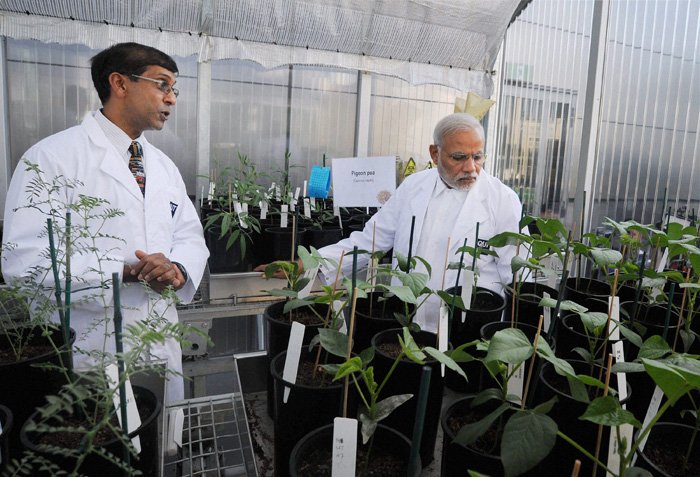Modi govt's 1st anniversary: Decisive action needed feels industry
June 10, 2015 | Wednesday | Features | By Rahul Koul Koul
Modi govt's 1st anniversary: Decisive action needed feels industry
File Photo: PM Modi in a plant biotech lab in Australia. The industry was expecting the clear policy on GM crops which hasn't happened yet.
Seen as a silver lining in the dark clouds, the government's recent decision to allow FDI into two major Indian pharma firms is being seen as step to push indigenous manufacturing. The Cabinet Committee on Economic Affairs (CCEA), chaired by the Prime Minister, Mr Narendra Modi, on April, 07 approved qualified institutional buyers to infuse fresh equity of upto 7 percent amounting to about Rs 2165 crore into Aurobindo Pharma engaged in manufacturing generic pharmaceuticals and active pharma ingredients. Besides that $1 billion Glenmark Pharmaceutical's foreign investment limit by FIIs has been approved from 35.07 percent to 49 percent. This will result in an inflow of about Rs 2,022 crore. Apart from manufacturing pharmaceuticals, the company is also engaged in Research and Development activities in drugs.
Key associations praise govt's policies
"The government has exceeded our expectations and has achieved more in the first year than any other government has achieved in their first year. The government's emphasis on lower tax rates and introduction of GST in coming year will greatly enhance competitiveness of the Indian industry," said Mr Sumit Mazumder, president, Confederation of Indian Industries (CII).
As per Ms Jyotsna Suri, president, Federation of Indian Chambers of Commerce and Industry (FICCI), "We are highly encouraged by the series of actions and policy reforms taken by the government in the last one year. The government has been successful in improving the state of the economy and setting the foundation for long term higher growth and development. Several path-breaking measures have been announced, notably the introduction of social security net for all citizens, rationalisation of corporate tax rates and implementation of GST by April next year."
"Having taken several initiatives to unclog infrastructure projects and improve ease of doing business, Prime Minister Narendra Modi's government is expected to give increased attention to the rural economy, although several of the financial inclusion programmes like the Jan Dhan Yojana would help the countryside," remarked Mr Rana Kapoor, president, The Associated Chambers of Commerce of India (ASSOCHAM).
Demands yet to be met feel BioSuppliers:
The biosuppliers were eagerly looking at some announcement for hassle free business and rebates over import taxes of research products. Besides that, the funding allocations to research institutes were also expected to go up. But there has been no progress so far on these. Echoing the common view, Dr Vishal G. Warke, director R&D, Cell Culture and Immunology, Himedia Laboratories mentioned, "We are still waiting for the Modi government to release the funds for most of the research institutions in India, as the lack of funds and grants from the central government has adversely impacted our sector. Scientists are unable to buy a lot of reagents and products as they are still waiting for the funds to be disbursed."
However, Dr Warke like his other counterparts in industry hasn't lost hope yet. He optimistically adds further, "On the whole however, the mood is very encouraging and positive with the Modi government and we feel that things should improve dramatically in the next year, in the biotech sector."
The focus on non-adversarial, corruption-free and predictable policy regime is the core strength of the present government. As per critics, the first year's rule can be given full marks only in foreign policy and economics but a lot remains to be done for health, agriculture, education and science. While the Swach Bharat Abhiyan and Make in India surely are being appreciated as unique programmes but it will take a longtime to witness a visible change on ground.
"India's biotechnology industry is on the cusp of entering a new era as the government focuses its efforts in building a research ecosystem that would spur medical innovation. It will take some time and too early to speculate, remarked an expert. This sums up the overall mood. Despite unmet expectations, industry seems to be hopeful of increased momentum over resolving specific issues of more regulatory clarity, business friendly environment and taxes. While the beginning has been good, this government surely has a lot to do and achieve. Perhaps industry will have to hold their horses for some more time.
Gaps visible in talk and action:
⌂ While government has launched huge flagship programs, the funding allocations for health schemes are meagre.
⌂ Make in India will only succeed if there is ease of research in the country. Research and development projects require enhanced budget allocations and clear regulatory environment.
⌂ No decision yet on Biotechnology Regulatory Authority of India (BRAI) Bill, allowing the free trials of genetically modified (GM) crops and amendments in Biodiversity Law.
⌂ The indigenous drugs manufacturing that is on government's radar too would require to undergo clinical trials. But the drop in number of trials due to fear of stringent rules has to be dealt with accordingly to encourage more investments in drug discovery.









